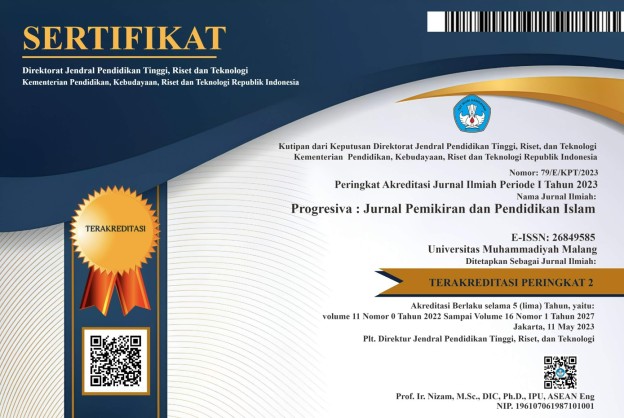Pursuit of Spiritual Happiness: Abu Hamid al-Ghazali on The Theory of Human Nature
DOI:
https://doi.org/10.22219/progresiva.v12i02.29265Keywords:
Abu Hamid al-Ghazali, Human Nature, Islamic Philosophy, Pursuit of Happiness, Spiritual AspectAbstract
This article explores the philosophical and spiritual perspectives of Abu Hamid al-Ghazali, focusing on his views on the nature of humanity, the spiritual and material aspects of existence, and the pursuit of happiness Al-Ghazali's philosophy is deeply rooted in Islamic thought and draws upon the Quranic and Prophetic teachings. Al-Ghazali posits that humans are composed of both a physical, ephemeral dimension (the material aspect) and an intellectual-transcendental dimension (the spiritual aspect). The article delves into al-Ghazali's classification of existence into two realms: the realm of decrees ('ālam al-amr) and the realm of creation ('ālam al-khalq). Human beings, according to al-Ghazali, embody both of these realms, with their physicality falling under the realm of creation and their spirituality under the realm of decree. Al-Ghazali introduces various terms to describe the spiritual entity within humans, such as al-‘aql (intellect), al-nafs (soul), al-qalb (heart), and al-rūh (spirit). He argues that while the body is material and earthly, the spirit is divine in origin and immortal. The soul, as God's creation, reflects this governance by ruling over the body without being located in any specific physical part. It emphasizes that the spirit belongs to the realm of Divine decrees, making it distinct from material entities. Al-Ghazali identifies different qualities within the human spirit, ranging from animalistic to angelic. He argues that the angelic quality, associated with the worship of God and the pursuit of Divine Beauty, represents the true essence of humanity. To attain happiness, individuals must purify themselves from worldly desires and base instincts. The article underscores the importance of knowledge in al-Ghazali's philosophy, with knowledge being derived from God and serving as the criterion that separates humans from other creations. Knowledge enables individuals to understand their purpose, responsibilities, and the path to happiness. The article explores al-Ghazali's perspective on happiness, highlighting his belief that it is primarily a spiritual and intellectual state. It emphasizes the significance of attaining knowledge of God for true happiness, as well as the importance of spiritual discipline and self-purification.
Downloads
References
Abū Dāwud, S. bin al-A. bin I. bin B. bin S. al-S. (n.d.). Sunan Abī Dāwūd. (M. M. al-D. ‘Abd Al-Hamīd, Ed.). Beirut: Maktaba al-‘Aṣriyyah.
Al-Fārābī, A. N. (1985). Al-Farabi on the perfect state: Abū Naṣr al-Fārābī’s Mabādiʼ ārāʼ ahl al-madīna al-fāḍila: a revised text with introduction, translation, and commentary. Oxford [Oxfordshire] : New York: Clarendon Press ; Oxford University Press.
Al-Ghazālī, A. Ḥāmid M. (1991). The Alchemy of Happiness. (E. L. Daniel, Ed., C. Field, Trans.). Armonk, NY: Sharpe.
Al-Ghazālī, A. Hāmid M. (2004a). Al-Iqtiṣād fi al-I‘tiqād. Beirut: Dār al-Kutub al-‘Arabiyyah.
Al-Ghazālī, A. Ḥāmid M. (2004b). Iḥyā’ ‘Ulūm al-Dīn. Beirut: Dār al-Ma‘rifa.
Al-Ghazālī, A. Ḥāmid M. (2008). Al-Ḥikmah fī Makhlūqāti-Llāh. Egypt: Al-Maktaba al-Tawf=iqiyya,.
Al-Ghazālī, A. Ḥāmid M. (2010). The Message from on High. (M. Smith, Trans.). Kuala Lumpur: Islamic Book Trust.
Clark, A. E., Flèche, S., Layard, R., & Powdthavee, N. (2019). The Origins of Happiness: The Science of Well-Being over the Life Course (First pape). Princeton ; Oxford: Princeton University Press.
Comprehensive Mental Health Action Plan 2013-2030. (n.d.). Retrieved September 4, 2023, from https://www.who.int/publications-detail-redirect/9789240031029
Cotesta, V. (2021). The heavens and the earth graeco-roman, ancient Chinese, and mediaeval islamic images of the world. In International Comparative Social Studies (Vol. 52, pp. 1–653). Leiden ; Boston: Brill. https://doi.org/10.1163/9789004464728
Csikszentmihalyi, M. (2009). Flow: The Psychology of Optimal Experience (Nachdr.). New York: Harper [and] Row.
Diener, E., & Biswas-Diener, R. (2009). Happiness: Unlocking the Mysteries of Psychological Wealth. Happiness: Unlocking the Mysteries of Psychological Wealth. https://doi.org/10.1002/9781444305159
Ibn Mājah, A. ‘Abd A. M. bin Y. al-Q. (1997). Sunan Ibn Majah. Dār Iḥyā’ al-Kutub al-‘Arabiyyah.
ibn Sina, A. A. (2004). The metaphysics of The healing: a parallel English-Arabic text = al-Ilahiyat min al-Shifa’. (M. E. Marmura, Trans.). Provo, UT: Brigham Young University Press.
Kao, L. E., Peteet, J. R., & Cook, C. C. H. (2020). Spirituality and mental health. Journal for the Study of Spirituality. https://doi.org/10.1080/20440243.2020.1726048
Koenig, H. G. (2009). Research on religion, spirituality, and mental health: A review. Canadian Journal of Psychiatry. https://doi.org/10.1177/070674370905400502
Mental health. (n.d.). Retrieved September 4, 2023, from https://www.who.int/news-room/fact-sheets/detail/mental-health-strengthening-our-response
Paloutzian, R. F. (2005). Handbook of the Psychology of Religion and Spirituality. (R. F. Paloutzian & C. L. Park, Eds.). New York: Guilford Press.
Rosenthal, E. I. J. (2009). Political Thought in Medieval Islam: An Introductory Outline. Cambridge: Cambridge University Press.
Downloads
Published
How to Cite
Issue
Section
License
Copyright (c) 2023 Jarman Arroisi, Hamid Fahmy Zarkasyi, Iwan Aminur Rokhman, Fahrudin Mukhlis

This work is licensed under a Creative Commons Attribution-ShareAlike 4.0 International License.


















